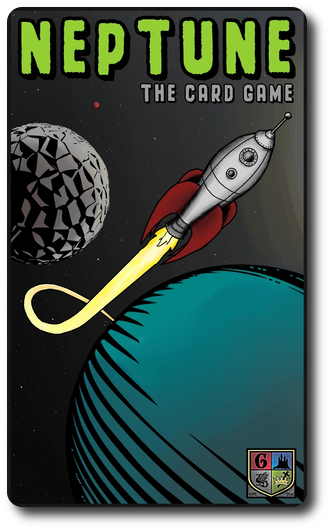
The Basics:
- For ages 7 and up (publisher suggests 10+)
- For 2 to 4 players
- Approximately 15 minutes to complete
Geek Skills:
- Counting & Math
- Logical & Critical Decision Making
- Reading
- Pattern/Color Matching
- Risk vs. Reward
- Hand/Resource Management
Learning Curve:
- Child – Easy
- Adult – Easy
Theme & Narrative:
- Win control over the galaxy, one system at a time
Endorsements:
- Gamer Geek rejected!
- Parent Geek approved!
- Child Geek approved!
Overview
You’d think there would be enough room for everyone in space. I mean, it’s space! Big, empty, and cold. But space is home to planets and these spheres made of gas, rock, and ice represent power. This is what people fight and die for. It never made much sense to you until you figured out how much money and control you could have if you had a planet or two of your own. So now you play the same game, fighting in the cold vacuum of space for a few floating planets.
Neptune, designed by Jason Glover and published by Grey Gnome Games, is comprised of 10 Blue System cards, 10 Green System cards, 10 Red System cards, 9 Special cards, 4 score trackers, and 8 score markers. The cards are as durable as your standard playing card and the score markers are little wooden pawn pieces. The illustrations, also by Jason Glover, are clean and depict various scenes in space. Including, but not limited to, planets, asteroids, and wormholes. Several names of the cards are nods to other games (Zogar’s Gaze and Jump Gate, for example) or pop-culture references.
Prepping for Takeoff
To set up the game, first select 6 Special cards. This can be done randomly or methodically. The remaining 3 Special cards are removed from the game. Special cards have purple numbers and card titles.
Second, shuffle the selected Special cards with all the Blue System, Green System, and Red System cards to form a single deck.
Third, deal the cards as evenly as possible to all the players, face-down. Players should look at their cards but keep them hidden from their opponents.
Fourth, give each player 1 score tracker card and 2 score markers of the same color. These are placed in front of the player with both score markers set on the zero (“0”) positions on the score tracker card. Any score tracker cards or score markers not used are returned to the game box.
That’s it for game set up. The player to left of the Dealer is the starting first player.
Galaxy Mapping
The primary card type used in the game is the System card, but all the cards share the same layout with different values.
- Card Power: This number value determines the “strength” of the card. The higher the card power value, the stronger the card. Strong cards beat weak cards when determining who wins a trick.
- System Color & Symbol: Displays the color of the system, which is used to determine what colored System cards can be played during a trick. A symbol is also provided for those who have difficulty distinguishing color.
- Trump Chart: A handy reference chart to help players remember how colors trump each other during the game.
- Score Value: The number of points the card is worth at the end of the game if it wins a trick. Note that the score value decreases as the card power increases. As such, stronger cards that have a better chance of winning overall don’t provide many points.
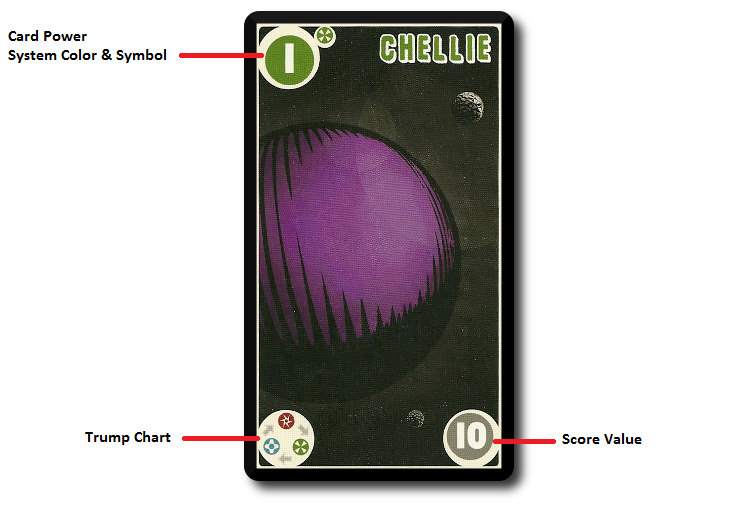
Exploration and Domination
Neptune is played in rounds and turns. The number of turns in a round is equal to the number of cards the players have in their hand. For example, if the player with the most cards in their hand has 5 cards, there will be 5 turns in the round. A turn is summarized here.
Step 1: Play Lead Card
The first player selects and plays any 1 System card. Special and Asteroid cards can be played only if the player does not have a System card. The card is played face-up in the middle of the playing area.
Step 2: Each Player Plays One Card
In turn order sequence, each player now selects 1 card from their hand and plays it to the lead card. Players must follow the lead card’s suit if possible. Suits include Blue System, Red System and Green System. For example, if the first player leads with a Blue System card, all the other players must play a Blue System card if possible.
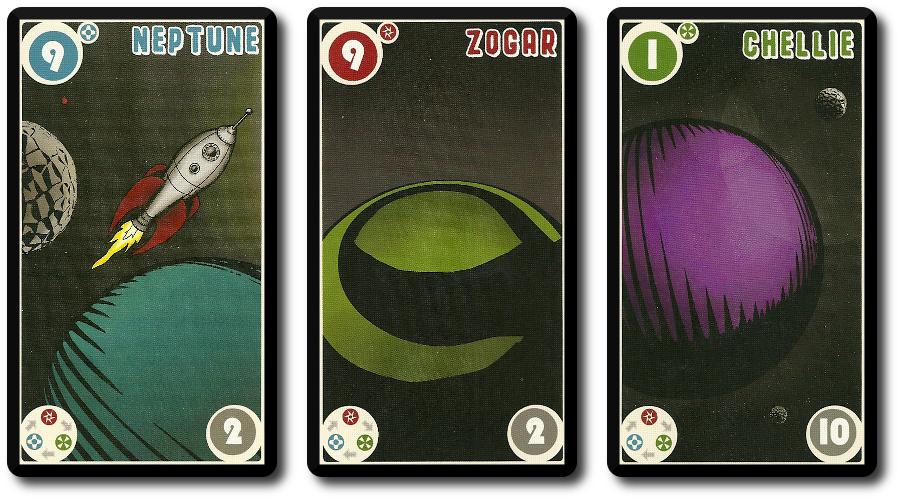
Example of 3 different colored System cards
If a player is unable to play a card that matches the suit, they may play any card from their hand.
Step 3: Determine Trick Winner
After every player has had a chance to play a card, it’s time to determine who won the trick.
- If all the cards match the same suit as the lead card, the card with the highest card power value wins.
- If a trump suit is played that beats the other cards, the trump suit wins.
Each System card has a trump. Blue Systems trump Red Systems, Red Systems trump Green Systems, and Green Systems trump Blue Systems. The trump chart found on every card’s lower-left hand corner can be used as quick reference during the game.
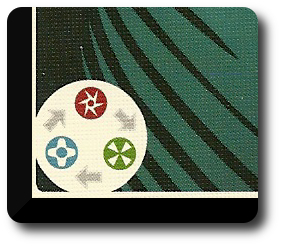
Recall that players must always play to the suit that lead unless they do not have the cards that allows them to do so. If they do not, they can play Special and different colored System cards. This opens the door for players to trump previous trumps. When determining the winner using trumps, it’s always the first played trump that wins the trick. To quote the rule book, “you cannot trump a trump”.
Or as my 10-year-old likes to say, “You cannot trump a trump, chump.”
After determining who won the trick, the winner collects the cards. The card that won the trick should be kept on top as this is the card that will be used during scoring. Keep the other cards underneath the top card, face-down. Place all won tricks to one side or in front of the player in a row.
Dangers in Space
Asteroids
Asteroids are nasty cards. When played during the turn, the player has no chance of claiming the trick. Instead, they are ruining the trick for whomever wins it.
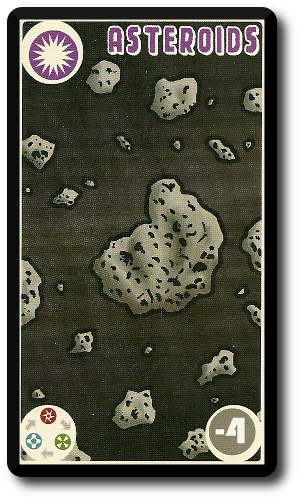
If an Asteroid is played as the lead card, then other players must attempt to play the same suit. In this case, another Asteroid. If they cannot, they can play any other card in their hand. However, the first card played other than an Asteroid card is the new lead card which must be played to. The challenge here is that the winner will be claiming the Asteroid card, which means players will want to duck under the highest card power to stay clear of the penalty the Asteroid card provides.
When an Asteroid is played during the turn, determine the winner of the trick as normal. Whomever wins the trick will place the Asteroid card that deals the most damage on top instead of the card that was used to win. During scoring, the Asteroid will remove points instead of adding them.
The Black Hole
The Black Hole devours everything and always wins the trick, unless an opponent played the Stationfall card and successfully met the card’s win condition. If the player with the Black Hole wins the trick, they place it on top of a previously won trick that was damaged by an Asteroid. The Black Hole then cancels the negatives effects of the Asteroid. The Black Hole can be played at anytime during the player’s turn, but has no impact when played as the final card of the final turn.
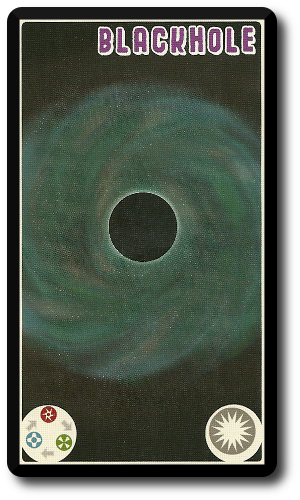
Stationfall
Stationfall is an odd card. It can only win a trick if all the cards contained in the trick (not including Stationfall) all have odd-numbered values or even-numbered values. The number of points the trick is worth is based on the number of players in the game. The more players there are, the more the card is worth. Cards that do not have any card power (the Black Hole, for example), are ignored if Stationfall is played.
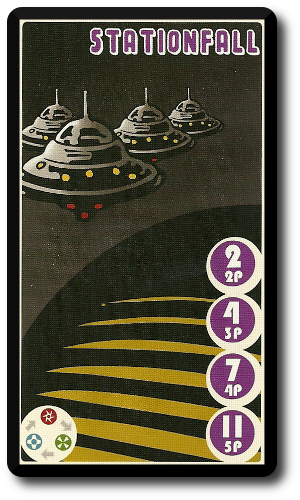
Jump Gate
Jump Gate allows for the old switcheroo. If the player wins the trick with Jump Gate, the player can decide which card in the trick they want to score. Jump Gate can also beat any card that has a lower card point value. Sounds great, yes? Most of the time, but not always. If the player wins the trick with Jump Gate and an Asteroid card is included with the cards, the Asteroid goes on top of the trick and the number of points it reduces is doubled. The lesson here is clear: don’t mess with wormholes.
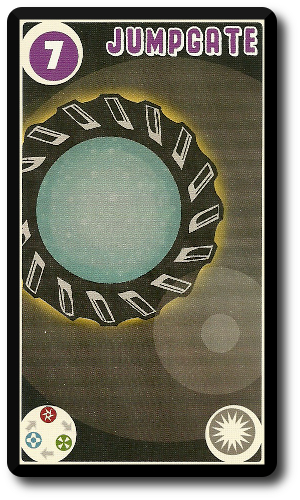
Space Bandit
The Space Bandit is a thief and since the only thing worth stealing in this game is points, you know that’s what they are all about. Play this “Special” card if you cannot follow suit. If you win the trick, you may keep it to score 5 points. Or, if you are feeling dastardly, you may swap this trick with any previously won trick that belongs to another player. Any tricks won with a Plasma Shield is safe from the Space Bandit’s pilfering.
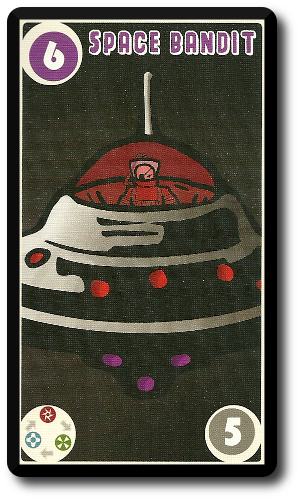
Proximity Mines
Proximity Mines are a trick destroyer and can only be played if the player is unable to follow suit. If the trick is won with Proximity Mines, the trick is not collected for later scoring. Instead, it’s removed for the round.
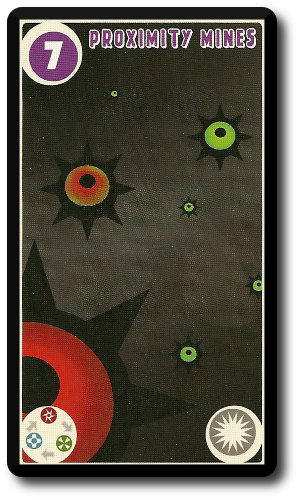
Plasma Shield
The Plasma Shield card does two things if the player wins the trick using this card. First, it will double the points of any previously won trick. Second, the trick the player attaches the Plasma Shield to cannot be stolen by an opponent using the Space Bandits card.
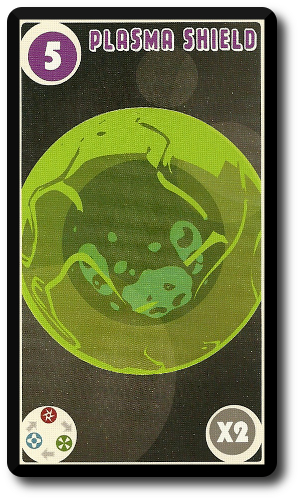
End of the Round Scoring and a New Round
After the last card has been played and trick won, the round ends. Players now determine the number of points they earned.
Using only the cards that won the each trick, the score value of each card is added together. Asteroid cards reduce the total. The players then add (or subtract) the score for the round to their previous scores and record it on their score tracker card. Note that players can never go below zero when it comes to points no matter how many asteroids smack them.
A new round now begins. All the cards are brought together, shuffled, and dealt. The first player of the previous round is the Dealer for the new round.
Galactic Victory
Neptune will end one of two ways.
- The first player to 50 or more points wins.
- At the end of the 5th round, the player with the most points wins.
Game Variants
For 2-Players
In a 2-player game, you should remove the first 6 cards and place them to the side, face-down. Then deal out the cards remaining in the deck as evenly as possible to both players. Do this for every round.
House Rules
The Mysterious 5th Player
If you had your wits about you during this review, you might have noticed a subtle discrepancy. The game is for 2 to 4 players, but the Stationfall Special card shows that a 5th player can be in the game. This might be a typo or it might not. The game only comes with 4 score tracker cards, but players can easily compensate for the missing card by writing points down. Whether it’s a mistake or note remains unknown, and frankly speaking, I haven’t bothered to ask the game designer. I kind of like the mystery of it all. Yes, my life is that dull, but a game of Neptune certainly is not with a 5th player. Tricks are harder to win and the game goes faster. Give it a try if you have 4 other friends sitting around. The game might not be designed for a 5th player, but it certainly doesn’t act like it when you play the game.
To learn more about Neptune, visit the game’s web page.
Final Word
The Child Geeks had difficulty remembering what the Special cards did at first. There aren’t that many to remember, but it’s difficult to keep such details in your head when you are first learning the game. The result was that Special cards weren’t played right or the game’s speed was slightly slowed as Child Geeks quickly read what the Special card did using the game’s rules. Overall, the game’s were all well-played, it was obvious that the Child Geeks had a strong grasp of the game basics, and not once did I see a card played out of suit that wasn’t intentional. One Child Geek said, “Is this Space Plague?” The Child Geek is referencing another game by Jason Glover titled Plague, which is very similar to Neptune. Another Gamer Geek said, “I like this game. It’s easy to learn and you have to think about your cards. Also, I really like the cards. They are big!” The cards are of “larger than average size”, which makes them easy to hold with small hands. When all the games were over, the Child Geeks voted to approve Neptune.
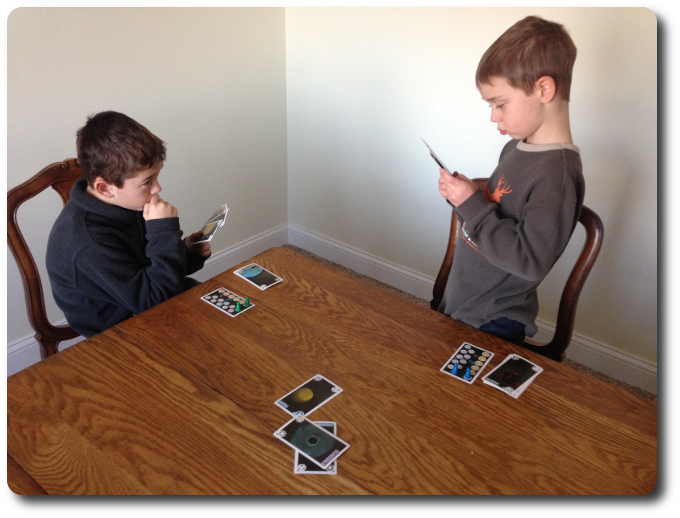
It’s my 7-year-old’s turn and he must decide which card he will lose to the giant Black Hole
The Parent Geeks, especially the casual gamers, very much enjoyed Neptune. One Parent Geek said, “I like this. It’s a a light and casual themed trick taking card game . I can always get behind those.” Another Parent Geek said, “The only thing I don’t like about the game was the learning curve for the Special cards. It would have been nice if the designer put more information on them instead of just in the rule book.” Like the Child Geeks, the Parent Geeks has a slight memorization curve when it came to remembering what the Special cards did. But this didn’t detract from the game play other than slightly slowing down a turn or two. During each game, the Parent Geeks demonstrated good card plays and sneaky trick stealing. When the spaceships were docked, all the Parent Geeks voted to approve the game.
The Gamer Geeks played Neptune and a number of them remembered playing Plague. This actually hurt the game more than I thought it would. According to one Gamer Geek, “This feels like a rethemed version of the other game. I didn’t like the original and I don’t like its space clone, either.” Another Gamer Geek said, “This would be a game I would play with non-gamers, like I would play Plague, but this is not a game I would want to play with my gaming friends.” When I pressed for more reasons why, most of the Gamer Geeks agreed that Neptune was too light of be of much interest.
Neptune is similar to Plague in the same way a green apple is similar to a red apple. Both games play a lot a like, score a lot a like, and have the same level of casual game play. The big differences are the game themes and the subtle game play that is unique to each. I personally find Plague to be a more challenging game, but only slightly. I also prefer the Medieval theme of Plague to the science fiction theme of Neptune. I don’t think Neptune is an improvement so much as a different take on the game.
Like I said, green apples and red apples.
If it weren’t for the fact that both games were designed by the same person, I’d raise an eyebrow. But as I see it, Mr. Glover wanted to create a science fiction themed trick taking card game that can be played by the entire family. He succeeded. I encourage you to play the game yourself with family and friends to determine if this rocket-propelled card game is ready for liftoff or should remain grounded.
This game was given to Father Geek as a review copy. Father Geek was not paid, bribed, wined, dined, or threatened in vain hopes of influencing this review. Such is the statuesque and legendary integrity of Father Geek.


Pingback: Plague Game Review - Father Geek